Fan Favorites Hub
Unfiltered Opinions on the Hottest Films Around
Viewer Picks
Movies Making Waves Among the Fanbase
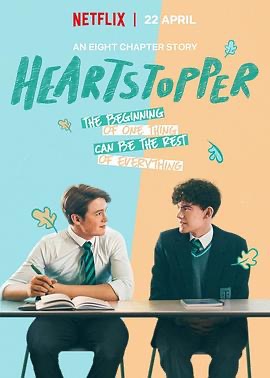
Heartstopper Season 1
Director: Drama, Comedy, Romance, LGBTQ+
Cast: Joe Locke, Kit Connor, Sebastian Croft
A boy meets a boy, becomes friends, and falls in love. The gentle Charlie and the football-loving Nick meet in high school. They unexpectedly become friends, and their friendship quickly blossoms into an unexpected romance. Charlie, Nick, and their friends embark on a journey of self-discovery and acceptance, supporting each other as they search for their true selves.
Read Full Review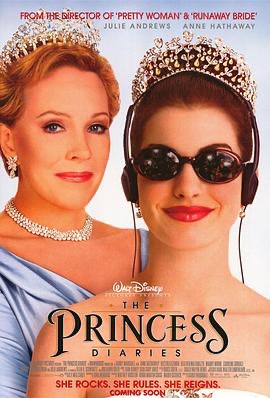
The Princess Diaries
The 15-year-old high school student Mia (played by Anne Hathaway) lives with her mother in the United States. She is very insecure and often mocked by her classmates. On her 16th birthday, after meeting her grandmother (played by Julie Andrews), she discovers that the elegant lady is the Queen of the small European country of Genovia, and Mia is actually the princess of that country. Initially, Mia is very reluctant, but after her mother intervenes, Mia's attitude softens. In order to successfully inherit the throne, the Queen must make a series of changes to her granddaughter, which troubles Mia, who is used to a casual and carefree lifestyle. This even causes tension with her best friend. However, when Mia's royal identity is revealed, she suddenly receives intense media attention. Overwhelmed by everything, Mia wants to escape it all. Luckily, she finds confidence again by reading her father’s diary. Mia eventually embraces her role as a princess and finds the love she desires.
Read Full Review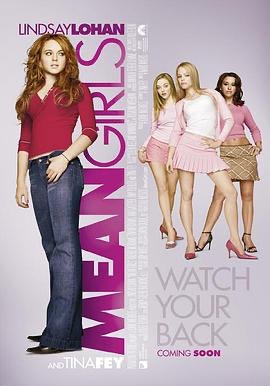
Mean Girls
Katie (played by Lindsay Lohan) is youthful, lively, and innocent. Due to her parents' work, she grew up in Africa, receiving a home-based education. At the same time, in that vast and untamed land, Katie developed a strong and resilient character. At the age of 15, Katie moves with her parents to Illinois and begins her first experience with school life. However, much to her dismay, her interactions with new classmates are far from what she had imagined. The girls’ world, seemingly calm and harmonious, is filled with hidden turmoil. In order to adapt to her new environment, Katie secretly learns the "rules of survival" and quickly joins a prominent clique at school, using her charming appearance. Her gentle nature seems to win her a group of close friends. However, everything changes the moment she falls for a boy named Aaron (played by Jonathan Bennett). It turns out Aaron is the ex-boyfriend of Regina (played by Rachel McAdams), the most popular girl at school. Although they’ve broken up, the domineering and arrogant Regina refuses to let Katie interfere. Thus, a silent war between the girls begins. It’s a battle about friendship, dignity, sincerity, and trust. How will the girls learn and grow from all of this?
Read Full ReviewFull Review Feed
Every Genre, Every Opinion — Your Next Watch Starts Here

Heartstopper Season 1
Director: Drama, Comedy, Romance, LGBTQ+
Cast: Joe Locke, Kit Connor, Sebastian Croft
User Rating: 8.9/10 (102987 votes)
It sounds like you're totally smitten with *Heartstopper*! 🥰 The way you described it really captures the essence of what makes the show so special. The plot is indeed quite classic—full of the expected LGBTQ+ representation, bullying, and emotional struggles, but it's so well-paced that it keeps you hooked without dragging on. And Netflix really delivered on this one! Charlie’s little curls are just adorable! I bet no one can watch him and not want to protect him. His journey to self-love and acceptance is so touching—he definitely deserves all the love. Watching him grow and feel confident, surrounded by his loving boyfriend and friends, is so heartwarming. Nick’s process of realizing his bisexuality was beautifully done too. The way it was portrayed felt so natural and relatable, and you can't help but feel for him during his confusion and discoveries. Tara and her girlfriend’s love story is also so cute! They're both so brave, and it’s clear they’ll only get stronger and get more love as they grow. The ending was tear-jerking, but it was that kind of sweet, bittersweet moment where you just want to see all of them happy and free to love whoever they want. To sum up, *Heartstopper* really makes your heart race, and even the toughest heart would be moved by it. There’s just something timeless and pure about those first loves and youthful moments. 💗
Read Full Review
The Princess Diaries
Director: Comedy, Romance, Family
Cast: Julie Andrews, Anne Hathaway, Héctor Elizondo
User Rating: 7.6/10 (362667 votes)
The most memorable line is when Lily's brother Michael, at the final dance, takes Mia to the garden and asks her: “Why me?” She replies, “Because you saw me when I was invisible.” In this world, there are few who have eyes that only stop for you. Before the dust is swept away and the veil is lifted, how many would truly recognize that you are my princess... In this world, hidden and unnoticed for many years, like a flower hiding in the corner, waiting only for your arrival to bloom its beauty for a lifetime...
Read Full Review
Mean Girls
Director: Comedy
Cast: Lindsay Lohan, Rachel McAdams, Tina Fey
User Rating: 7.1/10 (178476 votes)
Having spent much time on foreign platforms like LiveJournal and Tumblr (which are dominated by Western users), I've noticed that even today, they still love using *Mean Girls* quotes for memes. The most popular one is the "how do I even start to explain Regina George" monologue. First off, the Chinese title *贱女孩* (Jian Nv Hai) is terrible. The "mean" in *Mean Girls* means "vicious" or "bitter." The film depicts girls who use cruel words, demean others behind their backs, and fixate on trivial flaws. I think *坏女孩* (Huai Nv Hai, "Bad Girls") is a better translation than "jian," which too easily evokes misogynistic slurs. I’ve watched the film at least ten times. The first time, it seems like a typical teen movie. But over the years, as countless high school films have come out, *Mean Girls* still stands out with its unforgettable uniqueness. The crew is arguably the most star-studded in campus comedies. If you only recognize Lindsay Lohan, you’re missing out on a wealth of talent: - Screenwriter Tina Fey (who also played math teacher Ms. Norbury) is a renowned comedian and writer from *SNL*, with multiple Emmys and the 2010 Mark Twain Prize for American Humor (a single annual recipient, unlike the Mao Dun Literature Prize that awards multiple winners at once). - Director Mark Waters, who previously helmed *Freaky Friday*, built a great working relationship with Lindsay. - Producer Lorne Michaels, the *SNL* producer—Tina still worked at *SNL* when making this film, so she leveraged many *SNL* resources. In the behind-the-scenes, Tina mentioned enjoying collaboration with *SNL* colleagues. Though she felt old like a maternal figure, it had a familial vibe. Regina’s mom is played by Amy Poehler (another *SNL* alum, hilariously funny). During the 2008 election, she and Tina paired as Hillary Clinton and Sarah Palin—a perfect comedic duo. - Lindsay’s mom is Ana Gasteyer (also from *SNL*), and the principal is Tim Meadows. Anyone who’s watched *SNL* from a few years back will recognize them. - FYI, if you’re unfamiliar with *SNL*’s clout, just look at its alumni: Sarah Silverman, Chris Rock, Will Ferrell, Julia Louis-Dreyfus, Eddie Murphy, Mike Myers, Adam Sandler. Many New York comedians, like Conan O’Brien, started as *SNL* writers. Al Gore’s daughter currently writes for *SNL*. What confuses me is that *Mean Girls* was produced by Paramount, not NBC/Universal (which owns *SNL*). Lorne doesn’t address this in the behind-the-scenes. - Lindsay’s dad is played by the star of *Scrubs* and *The Middle*. - Regina (Rachel McAdams) was later the lead in *The Notebook*. - Karen (Amanda Seyfried), after playing many "dumb girl" roles, found success with *Mamma Mia!*. #### Tina Fey: A Feminist Voice in Comedy Tina’s characters in *Mean Girls*, *30 Rock*, and *Baby Mama* are smart, independent, career-driven women (slightly less so in *Mean Girls*) whose love lives suffer because they defy gender norms—a satire of patriarchal society. On *SNL*’s *Weekend Update*, she balanced feminist statements with self-deprecating humor about feminism’s awkwardness, mocking women who conform to patriarchy. During the election, she addressed female voters reluctant to back Hillary (seen as a "bitch"—here meaning "tough" rather than "mean"): "She is [a bitch]. And so am I. Bitches get stuff done. That's why Catholic schools use nuns instead of priests... At the end of the year you hated those bitches, but you knew the capital of Vermont." #### The Real-World Roots of *Mean Girls* The film originated from *Queen Bees and Wannabes*, a non-fiction book by Rosalind Wiseman (who appears in the behind-the-scenes). Instead of a novel, it analyzes the social dynamics of American high school girls, offering parenting advice. American media often prioritizes superficial beauty for women, influencing teens deeply. High school girls, in the final phase of adolescence, are highly insecure and sensitive about their identities. They strive to be "queen bees" or Barbie dolls, seeking attention through appearance rather than inner growth. Yet only a few can reach the top. American high schools typically have "perfect" girls who wield social power, envied and resented by others. Even "queen bees" have insecurities. Wiseman and Fey argue that "mean girls" badmouth others to divert attention from their own flaws and feel superior. The film aims to show that belittling others doesn’t elevate oneself—ruining others’ lives brings no personal gain. #### Fascinating Behind-the-Scenes Trivia - **Censorship for rating**: The film was nearly rated R for profanity but became PG-13. The Burn Book originally described a girl "masturbating with a hot dog" (changed to "made out"). A scene where Cady撞见 (catches) Gretchen and Jason was originally an oral sex scene (no explicit shots). - **Regina’s name**: Means "queen" in Latin. - **Age gap**: Amy Poehler (Regina’s mom) is only 6–7 years older than Rachel McAdams (who was 25 during filming). Lindsay was 8 years younger than Rachel. - **Casting choices**: Lindsay wanted to play Regina but chose Cady for her public image and younger sister. Amanda Seyfried (Karen) was a Cady finalist until Lorne saw her as a "dumb girl"—she admits asking naive questions. - **Injuries and rewrites**: Tim (the principal) broke his hand before filming, so a line explaining his cast was added. - **Musical moments**: Tina and Amy coached the Indian math student’s rap in the Christmas party scene. - **Easter eggs**: Cady’s mom works at Northwestern University, Ana’s alma mater. Tina chose Jonathan Bennett (Aaron) partly because he resembled her *SNL* partner Jimmy Fallon. - **Symbolic costumes**: The Plastics’ red plastic dresses in "Jingle Bell Rock" represent their superficiality. - **Norbury’s name**: Tina’s high school German teacher. - **Cameo connections**: Ashley Tisdale (from *High School Musical*) auditioned for Karen. Janis Ian’s name honors the 1970s singer (an *SNL* premiere musical guest and out lesbian). - **Wig and music**: Rachel’s blonde hair was a wig. The final dance song, *Built This Way*, is by DJ Samantha Ronson, Lindsay’s later partner. - **Cady’s name**: Inspired by 18th-century feminist Elizabeth Cady Stanton (Tina gives characters meaningful names).
Read Full Review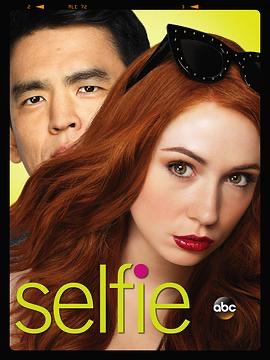
Selfie
Director: Comedy
Cast: Karen Gillan, John Cho, Sam Levin
User Rating: 8.5/10 (58586 votes)
The line from the male lead in *Selfie* is correct, social platforms are like little nails, flirting with everyone. Then you get a new self from the countless likes and comments, either inflated or diminished. When you gain something, you are also losing something... You post all your emotions and life details online, but in the real world, you lack normal interpersonal relationships, or you think you're not good at socializing. You treat strangers online as close friends, confiding in them, but it has no meaning for your growth. You spend a lot of time interacting, but neglect learning and other things, causing disappointment in others in real life. Every day, we see various people on social platforms, constantly posting photos, constantly showing off, constantly wanting to get more and more likes. Unfortunately, when this really becomes part of your life, you are controlled by social platforms. Meeting in person is not as warm as chatting on Weibo or WeChat. #HeadDownCulture# *Selfie 01* Waiting for bilingual subtitles, just updating the lines and some feelings XD
Read Full Review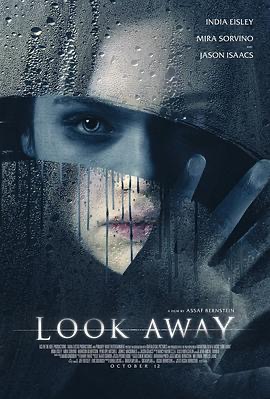
Look away
Director: Thriller
Cast: India Eisley, Jason Isaacs, Penelope Mitchell
User Rating: 6.4/10 (15263 votes)
I believe everyone, like me at the beginning, felt confused when watching this film. How could such a beautiful girl be bullied by her classmates? Jealousy from her "bitchy" best friend is understandable, but why did the male students pick on her? The film emphasizes through nude scenes that these kids are 18-year-olds in the throes of hormonal surges. Boys, is your eyesight that bad? This confusion persisted until I learned about her father's occupation— a plastic surgeon. The root of all evil and symbol of wickedness in this film is the father. If the father's excessively strict demands on his daughter don't ring any bells, then the scene where he measures her face with a caliper, indicating where to shave a few inches or reduce a few points, almost explicitly reveals the truth. The heroine has undergone plastic surgery. Remember when the daughter met her father's mistress at the plastic surgery clinic? The father said, "I made an appointment with my daughter." Many viewers were misled into thinking the appointment referred to watching a movie later. In reality, they had scheduled a consultation for plastic surgery, but due to unexpected circumstances, they had to switch to watching a movie. That's why when the father and daughter return to the clinic later, there's a scene where he says, "This is your birthday gift" and insists, "Say yes." This is clearly not the first time. The heroine might have originally been an ordinary-looking girl, and her current beauty is the result of multiple surgeries. Since the twin sisters were born with deformities, she probably had minor flaws too. Thus, the perfection-obsessed father used this as an excuse to "correct" his daughter's "defects" repeatedly. In the eyes of her classmates, she became a freak who kept getting plastic surgery. Once this puzzle is solved, the film's theme becomes clear. This is essentially an extreme story of "pushing a daughter to greatness." As the heroine confronts her father: "Would you love me if I weren't beautiful?" The father is a fascinating character. In the second half of the film, there's a reference to the Circle of Cain in Dante's *Divine Comedy*—the circle for "betrayers of kin." Cain is the murderer in the Bible's first homicide, who killed his brother. This allusion hints at three things: First, the father's actions: he abandoned/murdered one deformed daughter and treated the other as his personal work of art. He cheated with his patients, betraying his marriage and the mother. He isn't a good person by social morals, yet he demands physical and mental perfection from his daughter. When he sees his daughter eating sloppily, he's furious; when faced with her nudity, he snaps, "Do you think this shocks me? Isn't this what I see all day?" This isn't just the director gratuitously showing skin. Nude women in the plastic surgery room are ordinary to the father as a doctor. He doesn't feel emotion toward the bodies he's about to cut open—he only looks for where to make incisions, which is exactly how he views his daughter. The Circle of Cain mentioned earlier is located in the ninth circle of hell—Cocytus, the Ice Lake. As the teacher in the film says, "People here lack love and human warmth." As he speaks, the camera cuts to the heroine. Second: those starved of love do crazy things. After killing her boyfriend, who might no longer love her, the heroine clings to a sliver of hope to seek her father's love. Yes, driven by compensatory psychology, what she desires most is her father's love. Of course, I believe she knows it's unlikely. The allusion to Cain also hints at her third act—patricide. After eliminating the father who forced her to be beautiful, she sees ugliness in the glass reflection. Maria stops responding to Elain. The kind,懦弱 side of the heroine disappears, or perhaps the two finally merge: the imperfect Maria vanishes, and the powerful Elain is no longer perfect. I've seen people debate whether Elain is schizophrenic or haunted, and whether it's Elain or Maria who disappears. The film doesn't intend to give a clear answer because it's unnecessary and irrelevant. What matters is that Maria/Elain stumbles home and curls up once again in the arms of her mother, the only one who loved her unconditionally.
Read Full Review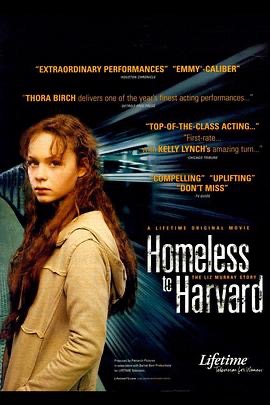
Homeless to Harvard: The Liz Murray Story
Director: Drama, Biography
Cast: Thora Birch, Makyla Smith, Kelly Lynch
User Rating: 8.1/10 (167974 votes)
This movie *The Poverty-Stricken Harvard Girl*, also known as *The Road to Harvard*, is based on a true story, and I finally got to watch it after a long search. I also read the original book before watching the movie today. It’s a powerful film, adapted from real events. Liz's parents were both addicts, and her mother suffered from schizophrenia, became blind, and later died of AIDS. Liz's life was filled with hardship: she stayed in shelters, slept in subway stations, and rummaged through trash. Never having a proper home, her teenage years were mostly spent wandering in chaos. Occasionally, she had to play the role of the adult, going back to care for her parents and sister. She often sat crying beside her mother's sickbed. The people around her were mostly those who had faced unfortunate lives, dealing with peer violence, sexual abuse, and mental health issues. Day after day, she lived in a world devoid of hope and dreams. When her mother passed away, Liz went to the rooftop of a building and cried helplessly in the rain. At her mother's burial, there was no pastor, no ceremony. After the few attendees left, Liz quietly lay on her mother's coffin and softly spoke of the past. Despite all this, Liz managed to work her way to Harvard University through sheer will and determination. To pay for Harvard's expensive tuition, she searched for all available scholarship opportunities. On the day of the interview, she didn’t have a decent outfit to wear, only a ragged dress and a borrowed coat from her sister. Yet, she received the scholarship and entered Harvard. During her speech upon receiving the scholarship, Liz said that her life was forever changed at that moment. Liz Murray, the poorest and bravest Harvard girl, stood in the golden autumn of Harvard with determination in her eyes. Liz was born in 1980, and the film was made in 2003. Later, Liz realized that Harvard was not the right fit for her, so she transferred to Columbia University. This achievement wasn’t just due to Liz's efforts; her teacher, David, played an important role in her success. One example is from a scene in which Liz was unsatisfied with receiving an A- on an assignment and went to ask David for help, demonstrating David’s insightful guidance and support. **David:** Hey, new student. **Liz:** (complaining) You approved my admission but don’t remember my name. **David:** I remember your name; I just want the others to stand beside you. **Liz:** You’re smart. **David:** You are too. **Liz:** (gathering courage) You gave me an A-. **David:** Yes, I thought it was good. **Liz:** How can I get an A? **David:** Liz, an A- is already a very high score. After all, this is your first assignment. **Liz:** (pauses) If I write something useful, would you help me revise it? (hands the paper to David) **David:** (smiling) Alright... In this moment, Liz's behavior is also worth learning from. It’s interesting to observe what this unfortunate girl—homeless, with a drug-addicted mother who died of AIDS and a father in a shelter—did to manage, with just two or three years of schooling, to enter the prestigious Harvard University. Perhaps it was persistence in doing the little things, keeping a dream, and maintaining faith. There are many touching moments in the film. For example, a class discussion that I found quite engaging: **Classroom Background:** The students complain about losing loose-leaf pages and question why textbooks aren't used instead. **David:** Hmm, textbooks. Why don't we use textbooks? Who knows? **Girl A:** They're too heavy. **David:** (dismissively) Uh-uh... yes, but that’s not why you can’t have the cigars (reward for good class participation). **Girl B:** They’re too expensive, the school can’t afford them. **David:** (dismissively) Uh-uh... I’ll keep my cigars today. (points to Liz) You, new student. **Girl C:** (defending Liz) Her name is Liz. **Boy D:** (adding) Oh my God, David, she’s been here a week, and you still can’t remember her name? **David:** (playfully) Liz, sue me if you like. (He throws Liz a thick textbook and she flips it open) **Liz:** Textbook, textbook... (flips through, what does it say?) **Liz:** Words. (Everyone laughs) **David:** (guiding) What kind of words? **Liz:** (just got to the preface) The author's words. (Everyone laughs again) **David:** No, no, this is important. What’s in my hand? (points to the loose-leaf pages) **Liz:** (starts to realize) Other people’s words. **David:** Why am I giving these to you? **Liz:** (understanding) Because one perspective gives you one view. (closes the textbook and pushes it forward) **David:** (pleased but not showing it, throws Liz a cigar) Cigar, cigar, “commercial trademark” (referring to the earlier classroom discussion), sold to me by the guy who sells bubble gum, cigars! Why can we only see one person’s story? (walks around the class, looks at everyone, and points to the textbook, slowing his speech to emphasize) **Boy B:** (questioning) But isn't that the official history? **David:** No, (to Liz) Kid, tell him what history is. **Liz:** History is... (pauses) All of us. All of us count. **David:** (nodding at Liz) The bell rings for the end of class. We are all ordinary people, but we can make our lives extraordinary. Many people love motivational movies because they see themselves in the stories of others, but often the results aren’t as brilliant. However, everyone can be as remarkable as Liz. She rarely went to class, less than three times a month, but like in that scene, she didn’t let the teacher take away her test papers and still insisted on doing the English assignment, saying, “No, I want to do it; it doesn’t seem that difficult.” We all need to pursue something, and these pursuits are not as difficult as we think. The hardest part is convincing ourselves that they are not hard and taking the first step. Many successful people summarize their past by saying, “I’m not a genius...” That's right, we are all ordinary people. “I just kept going…” Yes, even small things add up. “Einstein had to put in a lot of effort,” Yes, no one becomes successful by accident, but we can certainly make our lives extraordinary. Liz aced that test, and the teacher asked her how she did it. **Liz:** “I read a lot of books.” **Teacher:** “What kind of books?” **Liz:** “Encyclopedias. The lady upstairs, Ms. Iva, found some books, but there was no R-S section. If you asked me about that part, I wouldn’t have any answers. I just got lucky.” Yes, many people who are lucky might have seen the same book Liz referred to, but still wouldn’t be able to answer the question correctly. If you meet successful people, talk to them, or watch their interviews, you’ll find that they often take their success for granted. And it makes sense—success is the result of persistence in doing things that others are unwilling to do, the little things that may seem insignificant but, when accumulated, lead to greatness. As the ancient saying goes, *"The beginning is always the hardest."* And *"A good start is half the battle."* If you persist in something three times, by the third time, you will succeed. This is true.
Read Full Review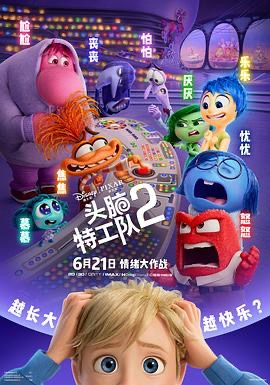
Inside Out 2
Director: Drama, Comedy, Animation, Fantasy, Adventure
Cast: Amy Poehler, Maya Hawke, Kensington Tormann
User Rating: 8.4/10 (325917 votes)
My "Jittery" Should Rarely Rotate Shifts with Its Companions. I first realized that my body couldn't fully relax during a consultation with a therapist. At the time, I was experiencing neck problems, and my left arm hurt so much that I couldn't lift it. The therapist squeezed my neck and said, "Your neck is so tight." Only after she said that did I truly realize that my neck was in an abnormal state of tension. This anxious, tense state had been with me for so long that I had assumed that this was just how my neck should feel. The therapist kept saying, "Your shoulders and neck are so tense, you need to relax." The more she encouraged me to relax, the more anxious I became, and my body became even tenser. My neck and shoulders lost control of my brain, and my mind began to wander. I thought about something my mother often told me: "Straighten your back." Whenever she said that, she would stretch out her hands to straighten my hunched shoulders and realign my forward-tilted neck. If I relaxed my neck and shoulders, I would slouch; but if I slouched, it would worsen my posture and neck problems in the long run. In that moment, my neck and shoulders were in an awkward position: shrinking forward meant a life of relaxation and degradation, while pulling back meant a healthy and graceful future. I really wanted to tell the therapist: "My neck and shoulders have never relaxed in my life. What does it feel like to relax? I don't know." **Inside Out 2** continues the story from the first movie, mainly focusing on the protagonist Riley, who, after learning how to handle various emotions, faces the onset of puberty. Her emotions become more complex, more intense, and often uncontrollable. Her self-confidence plummets from its highest point to the lowest. On one hand, she is still a child who loves watching preschool cartoons; on the other hand, she admires the older girls with dyed hair and tries to make herself look just as cool. Anxiety and inferiority occupy her entire life, as she worries about not being good enough to gain her teacher's recognition, not being cool enough to fit into the clique, and feeling incapable of even enjoying her hobbies. Who hasn’t gone through this phase of puberty? When I saw Riley get her first pimple, it reminded me of my own adolescence: pimples covering my face like a sea of flowers, and my friend used to say that if she went blind, she could identify me by feeling the bumpy texture of my forehead, just like a Snickers bar. My neck and shoulders first gave way during puberty, too. As one of the few girls in the class who developed early, I dressed like Madonna wearing a pointed cone bra at a concert. I felt strange and was afraid of being ridiculed. To hide those awkward cones, I started unconsciously hunching my back. My neck, which had once leaned forward, was never the same again—just like Riley, my "Jittery," "Awkward," "Disgusted," and "Longing" have been with me since puberty. I guess their control panels were designed on a viewing platform, just like my forward-tilted neck. From that platform, I can see the long river of awkward puberty memories floating below. The design of Jittery is brilliant. From the outside, it already looks like it's anxious to the point of madness, but it always wants to do good. As a minor antagonist in the movie, it’s hard to dislike. Because the forward-tilting neck impacts both image and work efficiency, I joined a gym to work on my back. Once my back was stronger, my neck stopped hurting, and I had more energy at work. But the more I worked, the more my neck tilted forward. This endless cycle continues. Anxiety has woven an invisible scarf around my neck, showcasing its "choking" techniques. As a movie character, Riley is far luckier than real people. The movie uses a hockey game to help Riley find herself, while my self didn’t return to the control room until puberty ended, hormone levels stabilized, and I went through more life experiences. The multiple selves presented in the movie are more like compromises with my personality, giving up resistance to fate—this is just who I am, and I’ll let it be. In the movie's final scene, the nine emotions finally compromise and share the control room. After puberty, Riley's emotional changes become more subtle and complex, signaling that as we grow up and become more self-aware, we also become more skilled at handling past emotions. Unfortunately, the final part of the movie, where Riley's secrets locked away in her mind's "secret prison" never return, was a missed opportunity. When a person faces their true self, one significant feature is that they become more willing to accept their past shame. Perhaps Pouchy is modeled after someone on the creative team who loved watching "Dora the Explorer" as a child, or when we see Lance, we’re reminded of the long-haired characters in "Final Fantasy." The retro animation and game design of these two references made the whole theater laugh, setting the tone for the movie's audience: like "Inside Out 1," it's not just a children's movie but one made for adults who have faced themselves and experienced—or are currently experiencing—anxiety. This article should’ve been called **"A Life Dominated by My Neck"**. Months ago, during a night of neck pain, I had already typed that title. Tonight, sitting in the theater with muscle-relaxing patches on my neck, pretending it feels fine, when I saw Jittery trying to control everything but losing control at the control panel, tears couldn't stop flowing. I think the orange little figure at my control panel must be very tired. How’s your neck doing? I wish your neck wouldn't have to carry so many burdens anymore. Unfortunately, for most of us, our puberty was tougher than Riley's, and we unknowingly became hosts of anxiety. While American kids are worrying about fitting in with the cool girls, we’ve been worrying since first grade about whether we can get into a 985 or 211 university. This anxiety is refreshed every week with tests, and before "Disgust" can even touch the touchpad, "Jittery" takes control again. Anxiety makes us lean over our desks day and night, writing test papers, our necks always tilted forward toward an uncertain future. As we grow older, the desk turns into an office desk, the homework becomes a computer screen, but the neck still leans forward as we stare at the screen. Many people in foreign countries like to teach people how to distinguish Asians, but they don’t need to focus on makeup, clothing, or height; those with the most forward-tilting necks are usually us. This movie is very realistic: When you're anxious, it feels like your emotions can’t appear, and even crying feels like a mistake. When anxiety takes over, we can only reflexively hide our feelings, but "Disgust" just wants to cry when it touches the control panel, and yet it gets stolen by anxiety. The more anxious we are, the busier we get, sometimes completely lying on the sofa, giving up, but both emotions are fighting in our brain. Do you remember Hu Shi’s diary? On July 4th, he was still anxious, encouraging himself to work hard and read Shakespeare's works. After playing cards for three days, anxiety took over again, and in his diary, he scolded himself for being lazy. He went back to playing cards the next day. This type of playing doesn’t even bring real joy, just like how our desks are filled with empty summer homework during the holidays, each day spent with anxiety. This is me: sometimes anxious, sometimes disgusted. When I’m anxious, I quickly study for a while, and then I lie down again. It's like doing sit-ups with a Motorola flip phone. When we are anxious for too long, we forget that as children, we once had pure joy. In the movie, "Joy" says, "I understand now, growing up means no longer needing joy." On one hand, the threshold for happiness increases—joy seems to have become harder to satisfy ever since I started pretending to be a cool teenager in puberty, pretending to leave behind my childhood happiness and join the adult world, drinking coffee and tasting life's bitterness. Over time, I even forget what real joy feels like. On the other hand, pure joy has become too extravagant, and enjoying it feels guilty. Anxiety and happiness follow each other, with the joy of food reminding us of the anxiety of dieting, the joy of vacations followed by the anxiety of returning to work, and the joy of love mixed with the anxiety of reality. In the movie, Jittery has a screen that projects possible future disasters, and anxiety arises from imagining too many negative things, which makes it worse. People often say we should focus on the present and not worry about what hasn’t happened yet, but it's because of anxiety that we have the motivation to work hard and change our lives.
Read Full Review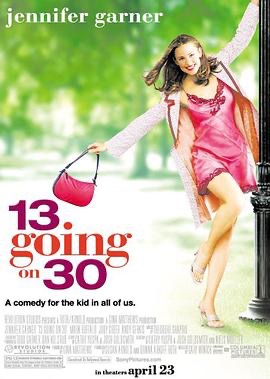
13 Going on 30
Director: Comedy, Romance, Fantasy
Cast: Jennifer Garner, Mark Ruffalo, Judy Greer
User Rating: 7.1/10 (50151 votes)
2008.12.14 Sunday SunnyWho can give me a bag of wish powder Tell me what I should cherish and what I should let go Finally finished watching 13 Going on 30. I really envy Jenna. A person’s present always leads to that particular future self. No one knows if the persistence at that time was right or wrong. Sometimes, the very thing you dream of could be the source and beginning of your mistakes. That bag of wish powder gave a 13-year-old girl the body and life of a 30-year-old. But in reality, it just gave her the opportunity to break free from herself and her original life path. The 30-year-old life felt like a dream within a closet—vivid and awakening. After waking up, no one would care about the schemes and wars surrounding Poise magazine and Sparkle magazine anymore. The story is exciting and convincing. But does this mean that a 13-year-old child’s mentality is better able to handle life and its challenges than that of a mature adult? This question is worth pondering and reflecting on. Today I’m 13, tomorrow I’m 30. No matter what, I believe that after such a magical time-travel journey, anyone would experience that moment of realization. And I still hope— Who can give me a bag of wish powder And tell me what to cherish and what to let go.
Read Full Review
Heinähattu ja Vilttitossu
Director: Family
Cast: Tilda Kiianlehto, Katriina Tavi
User Rating: 8.2/10 (1228 votes)
Bored out of my mind, I spent the entire day watching movies. The only one that left an impression was *Siff and Siso*, shown on CCTV1’s Sunday cinema. After searching everywhere, the only place I found a review was in the *Maoming Daily*. There was no gripping plot, no dazzling beauties, but I saw gardens lush with green grass, window sills overflowing with flowers. I saw women in bright clothes with two funny little buns in their hair, with larger frames, yet living comfortably. I saw two girls, one sensible, one lively, both impossible not to love. I saw mothers and daughters playing on the balcony, seemingly returning to childhood, and I began to hope for a daughter someday. I saw a policeman acting as a referee, just to make the child who won the championship happy. I saw colorful dough in the garden, and wished that when life feels unhappy, I could sit in a tub of dough like that. I don’t know if this is the true life in Finland, but there’s no doubt that I’ve come to love this country and long for this way of life.
Read Full Review
The Witches
Director: Comedy, Fantasy, Adventure
Cast: Anne Hathaway, Octavia Spencer, Stanley Tucci
User Rating: 6.0/10 (30515 votes)
In December 1968, in Chicago, 8-year-old African American boy Gatsby loses his parents in a car accident and moves to live with his grandmother in Demopolis, Alabama. His grandmother buys him a pet white mouse, which he names Daisy. One day, at a grocery store, they meet a Black witch who offers Gatsby candy. His grandmother tells him the story of her childhood friend, Alice Brew, who became a chicken after accepting candy from the witch. The witches are notorious for hating naughty children; they are bald, with mouths extending to their ears, and their fingers and toes have three digits. Gatsby’s grandmother is a Vodou priestess. For safety, Gatsby’s grandmother takes him to New Orleans and has his cousin, Easton, book a room at the Royal Island Hotel, where Easton works as the executive chef. Unfortunately, the witches, disguised as the Child Abuse Prevention Society, are holding a meeting at this hotel. Gatsby sneaks into the attic to spy on the gathering, where the elder witches plan to eradicate all children. A fat boy, Bruno, accidentally stumbles into the meeting and is transformed into a mouse by the witches' magic. Daisy bravely saves Bruno, but Gatsby is caught by the witches and also turned into a mouse. Daisy's real name is Mary. The three mice mix the witches’ purple potion into the soup, causing all the witches to turn into mice as well. They then steal all of the witches' potions and money.
Read Full Review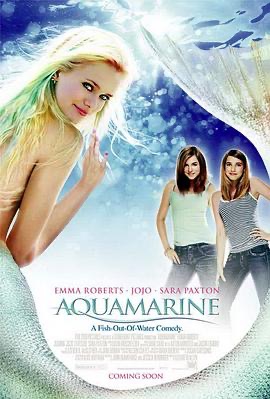
Aquamarine
Director: Comedy, Romance, Family, Fantasy
Cast: Emma Roberts, Joanna Levesque, Sara Paxton
User Rating: 6.7/10 (41408 votes)
This is such a cute movie that makes you smile uncontrollably, like the feeling of looking up from the bottom of the sea to see the sunlight sparkling on the waves. There's no depth, no sadness, and no burden—it's simply a fairy tale where the princess and the prince know each other's hearts, and the best friends hold hands and embrace, their friendship as solid as can be. The main characters are pretty ordinary: one is chubby with a round face, the other is small and unremarkable. The little girl's emotions are clear on her face, and when faced with parting, she encounters a real mermaid. In order to make her wish come true, she sets aside her own dreams to help the mermaid win over the handsome lifeguard. There's tracking, competition to worry about, and the constant concern of the mermaid's tail being exposed. This summer is full of thrills. After all, they want to continue living together, and they even see a storm as a good thing, putting aside their pink fantasies for a moment. One wish is all they need. Two little girls and a mermaid, three days of time, each with their own goals—it’s hard to believe they could form such deep bonds. Even the practical questions of how to truly recognize love and whether the man, who was showing off his muscles to other women just days ago, can truly be trusted with their hearts, remain unanswered. But, since it’s playful, lighthearted, and simply a warm story, we accept it without question. In the end, the wish remains just that—a wish, like an unopened magic box, more precious than any gift. In the end, the three are still together, but they move in different directions, leaving behind the memory of a summer's end. Let’s indulge in the sweetness for a while, watching the fireworks light up their faces, seeing them dance together with her gracefully walking into his arms, watching him nervously joke about her tail, the phosphorescent glow shining beautifully. Watching them tumble and laugh together, not knowing whose arm or whose leg belongs to whom, seeing them bicker like children and make up just as quickly, feeling the warmth of a kiss, but knowing it’s the embrace that truly matters. Summer is indeed the season for us to be together.
Read Full Review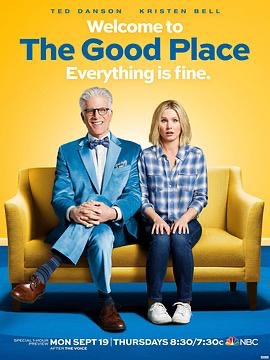
The Good Place Season 1
Director: Comedy
Cast: Kristen Bell, Ted Danson, William Jackson Harper
User Rating: 8.5/10 (13343 votes)
I never thought that a sitcom could seamlessly incorporate philosophical theories while making us laugh. A fictional afterlife "Good Place" certainly serves as a perfect setting to practice philosophical ideas. 1. **Categorical Imperative** When Chidi discovers that Eleanor does not belong to the Good Place and contemplates whether to lie to help her, he asks himself: Should he help Eleanor according to the moral principles of the Categorical Imperative? This question perfectly triggers Chidi's decision-making paralysis and causes him stomach pain... Immanuel Kant introduced the concept of "Categorical Imperative," which requires a person to act consistently according to immutable moral principles, no matter how external circumstances change. According to Kant’s theory, lying, stealing, or any other immoral act has no excuse. Even a white lie, done with good intentions, is still immoral. Since Eleanor does not belong to the Good Place, if Chidi helps her, it would involve deception and cheating, which would be considered immoral according to Kant. However, on the other hand, Eleanor asks Chidi to help her become a better person. Refusing to help someone improve is another form of immorality. Chidi feels that whatever choice he makes is immoral, leading to a moral dilemma that gives him stomach pain. Another example of the "Categorical Imperative" is when Chidi gives insincere praise to his friend’s hideously ugly shoes. Even if it is out of kindness, it’s still lying, which violates the Categorical Imperative. Thus, Chidi cannot sleep over this small white lie and feels compelled to tell his friend the truth once the surgery is done. So, what kind of answer would satisfy Kant? A misleading answer would be acceptable, such as: "I have never seen shoes like this (beautiful/ugly)!" In Kant’s view, a misleading answer is not immoral because, when lying is an option, a misleading statement is itself a form of respect for moral commands. ### 2. **Utilitarianism** Compared to Kant’s Categorical Imperative, Utilitarianism is undoubtedly a philosophy that is easier for most people (including Eleanor) to understand: one should choose the actions that achieve the "greatest good" for the greatest number, even if it means sacrificing the interests of a few. Utilitarianism sounds flawless until faced with dilemmas like the "trolley problem." It is said that later seasons of *The Good Place* perfectly reproduce the trolley problem, but in the first season, there is already a Utilitarian dilemma: Chidi struggles with whether to help Eleanor because, on one hand, helping her become a better person and stay in the Good Place would maximize overall happiness. However, if Eleanor stays, it means Chidi’s true soulmate will never appear, which sacrifices his personal happiness. Once again, Chidi is at a loss, guided by philosophical theories. ### 3. **The Moral Value of Motivation** In the second half of the first season, the four-person team hopes to raise Eleanor’s score to keep her in the Good Place, so Eleanor performs many "good deeds," such as holding doors for others, organizing apology parties, and giving gifts. However, none of these actions affect her score. This brings us back to Kant (who probably contributed over half of *The Good Place*’s philosophical theories). Kant believes that "the moral value of an action lies in its motivation." If the motivation is to satisfy personal interests, then the action cannot be considered moral. Therefore, all of Eleanor’s good deeds, done with the selfish motive of staying in the Good Place, are not counted in the scoring system. A similar situation happens with Tehani: Even though she raised 600 billion dollars through her charity event, her impure motives mean she still does not belong to the "Good Place." So, when Eleanor’s motivation changes and she performs good deeds not for selfish reasons, those actions finally become "moral deeds" and are counted in the score. The big twist in the last episode of *The Good Place* is certainly interesting, but isn't it just as fascinating to see real-life acting of philosophical theories and moral dilemmas in a sitcom? It certainly brings a smile and makes you reflect.
Read Full Review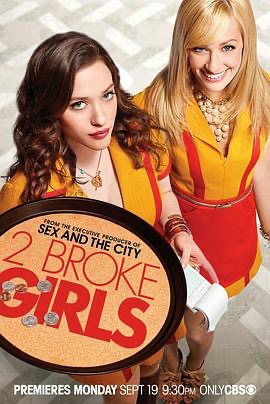
Broke Girls Season 1
Director: Comedy
Cast: Kat Dennings, Beth Behrs, Noah Mills
User Rating: 9.1/10 (305867 votes)
I was part of the 2003 college entrance exam cohort, entering the exam hall during the peak of the SARS epidemic. I graduated in 2007, and I had the option to choose Beijing or stay in Chengdu. But in the end, I did what I consider a failure and returned home, settling down in a small fourth-tier city. Now it’s 2011, and the age when I had ambitious dreams feels farther and farther away. I have too many regrets, too much cynicism, and an energy that, after all these years, has slowly withered into nothingness in the monotony of life. I have a stable job, stable social connections, stable income, and stable routines. On the surface, everything seems great, but I often feel like I have nothing. As a child, I dreamed of having a sweet little dessert shop, flipping through novels in the scattered sunlight, pretending to be artsy and sophisticated. And now, this is the only dream I have left—about freedom and peace. I really need a dream. A long time ago, I calculated the cost of opening a dessert shop—rent, utilities, taxes, and all the expenses I would need to cover by selling a certain number of cups of coffee every day. How much startup capital could I gather? How much would I need to borrow from the bank? Where would I source the ingredients? How would I market it, promote it, and eventually profit? All these questions swirled in my mind. But no matter how much I thought about it, it was always in the planning phase. Year after year, until time wore down my courage and edges. On the night when Caroline was drunk, she told Max, "I have nothing now. I need that bakery so badly. I know you're scared of success, but I believe in your dreams. Please, let’s work together. We’ll succeed." Actually, we all crave a sweet dream when life is piercing us from every direction.
Read Full Review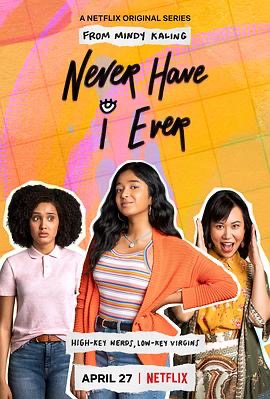
Never Have I Ever Season 1
Director: Comedy
Cast: Maitreyi Ramakrishnan, Lee Rodriguez, Ramona Young
User Rating: 8.2/10 (60297 votes)
When teen series go beyond just talking about romance and instead explore deeper themes like cultural fusion, the constraints of tradition on women, and embracing our individuality. We are growing up in an era where beauty standards are very "linear": white! Thin! Society’s stereotypes of beauty have labeled so many things for girls. No matter your skin color, body type, whether you’re gay or asexual, we are all beautiful. Every girl should look in the mirror and say aloud to herself: "You are beautiful, your tan skin is beautiful, your muscular body is beautiful, your hijab looks beautiful, and your curly hair is beautiful! Most importantly, Devi! You look beautiful in that saree during Ganesh Pooja." When Devi finally reconciles with herself, her mom, and her friends, I was so happy. Devi has the hardworking spirit of a traditional Indian girl, as well as the quirky charm of an American sweetheart. In my eyes, every girl in this show is beautiful! My dear girls, we’ve all looked at ourselves and thought: my nose should be higher, my skin should be lighter, maybe if I were thinner, everything would be better. But those things we want to change are what made us who we are!! Just like Devi, who said she didn’t want to be Indian, but when spreading her father’s ashes, she prayed devoutly with the Sanskrit chants. She said she wanted to be a "cool kid", but she turned red-faced, passionately debating for Equatorial Guinea in Model UN. Sisters, I want to say: you are beautiful just as you are, you are beautiful when you don’t care about what others think, you are beautiful when you are proud of your culture, you are beautiful when you show care for your friends and family, and you are even more beautiful when you work hard for your dreams! Don’t change yourself to fit into society or please others. Please lift your head, stand tall, and unapologetically be yourself!
Read Full Review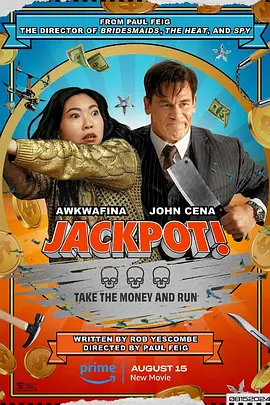
Jackpot!
Director: Comedy, Action
Cast: John Cena, Awkwafina, Simu Liu, Seann William Scott, Michael Hitchcock, More...
User Rating: 5.8/10 (4111 votes)
Even though I am a fan of Zhao Xina, I have to say that this movie is just average, barely passable. The black is not black enough, the comedy is not comedy enough, even the end credits are very average. It is purely a ridiculous action movie under the name of comedy. There is no fun, no exciting fighting and action scenes, and the doubles are visibly exposed many times. The heroine is always playing dumb, with a tangled brow, acting ugly and weird, and the golden costume is embarrassing. And she foolishly avoids the pursuit of the whole city without changing clothes, so dazzling. She doesn't know how to use a wig, hat and sunglasses to cover up, and there is a mask behind, but she took it off. When I saw the street puppets, I thought she could find a puppet costume to hide in, but she didn't. I really don't know why she always gets roles. Her voice acting in cartoons before was very recognizable, and I knew it was her as soon as I heard her voice. As soon as Liu Simu showed up in the commercial, I knew he would be the villain. The gold Rolex watch is nice, it seems to be a Daytona. I don't know what brand Zhao Xina is wearing, there is a close-up of the dial, but I don't recognize it. Judging from his character in the film, it should not be as expensive as a Rolex. The watch chain also looks like a Rolex. If he continues to act in films like this, his acting career will be ruined, which means that he and his management team don't know how to choose scripts. It's worrying. I have been a fan of him since the Self-Stop Squad. He is definitely the successor to the governor, and he has some more advantages. It's a pity that I didn't meet a good production team, a good script, a good role, and a good director. None of them can be missing. The governor had a good eye back then and was good at choosing films to shoot. That rock star is handsome! His clothes are nice and his home is tasteful, but can't the safe house be controlled from inside and locked and the password changed? And then they left him outside the house knowing that the password might be leaked. If it wasn't arranged in this way, the drama could have ended abruptly. So the script is very bad, and the incident of mobile phones being attacked was vividly demonstrated by Lebanon these days, proving that the plot of the movie is not purely fabricated. Ha ha ha ha. Liu Simu was furious. It was incomprehensible that the landlord had a good ending. And the black old man didn't get any material rewards, which was also... The director is completely brain dead. The main plot of the film is...
Read Full Review
Moana 2
Director: Comedy, Animation, Musical, Fantasy
Cast: Aulii Cravalho, Dwayne Johnson, alalai Chong, Rose Matafeo, David Fahn, More ...
User Rating: 6.6/10 (33322 votes)
The quality of Disney's animation works in recent years is really worrying. The story routine is directly worn as a coat, and the body is also skinny. Every time they make animations, they are free to follow the formula. Encountering difficulties + marching forward + retreating after setbacks + spiritual growth + overcoming difficulties + super happy ending = "Moana 2". This film is even more sloppy and hasty. The main characters have a clear division of labor and lack novelty. The villains have no sense of oppression, and they are just here to play a supporting role, with very little face time. The growth of the protagonist is exactly the same as the first one. Last time, Moana helped Maui untie his knot, and this time, Maui helped Moana achieve sublimation. Both of them drank a sip of chicken soup, but in the final analysis, it is still the same bowl of soup. The only bright spots are the supporting animals, which can make people laugh accidentally, but it's just a laugh, and this is the style of Disney animation. If not, the watchability will be greatly reduced. Comparing "Inside Out" and "Oceans", Pixar is more stable, thoughtful and progressive, while Disney is conservative and will only ruin its reputation. Just listen to the movie songs.
Read Full Review
A Complete Unknown
Director: Drama, Music, Biography
Cast: Timothée Chalamet, Edward Norton, Elle Fanning, Monica Barbaro, Boyd Holbrook, More...
User Rating: 6.5/10 (12791 votes)
Although the film is adapted from Elijah Wald's "Dylan Goes Electric!" and the narrative is based on Dylan's groundbreaking (actually farcical) electric performance at the 1965 Newport Folk Festival, as a Dylan fan, what touched me most after watching "A Complete Unknown" was Sylvie Russo - yes, this is a pseudonym in the film, and she is actually Dylan's early muse, Suze Rotolo, the beautiful and playful girl on the cover of the great The Freewheelin' Bob Dylan. Rock fans are familiar with the story of Suze Rotolo, including her autobiography "The Time of Letting Go", which was translated into Chinese by Chen Zhen many years ago, and Dylan's description in "Chronicles", which together outline the time that young Dylan spent in Greenwich Village, New York. Although the role of Suze was adjusted in "A Complete Unknown", such as Suze never participating in the Newport in 1965, not to mention the plot of their farewell across the iron fence, including the ambiguous description of Dylan and Suze's breakup in the movie (an important point is that Suze was pregnant with Dylan's child, and they eventually decided to abort together, which was an inevitable link in the collapse of their relationship), these adaptations in the movie partially protected Suze, and also protected Dylan, who is still alive this year at the age of 83, and Joan Baez, who is 84 years old. On the other hand, these adaptations are quite successful in my opinion, and they supplement (actually confirm) my conception of the young Dylan at that time as a Dylan fan. There were three scenes, three times when Dylan sang, and Sylvie Russo (let’s keep calling her by that name) in the audience touched me: The first time was when Dylan sang "A Hard Rain's A-Gonna Fall." At this time, Dylan was already a rising folk star, and when he was recognized by fans, he quickly got into the car (a tribute to the Beatles' hard day life?). Sylvie, who appeared on the cover and was probably the happiest girl in Greenwich Village in the eyes of the outside world, was in the audience. She swallowed her saliva and then showed a relieved but bitter smile - at this moment, Sylvie knew that Dylan no longer belonged to him. This was the first time I cried in the movie. The second time, in Newport, Dylan sang The Times They Are A-Changin, with guitar, harmonica, hoarse voice, and the fans singing in chorus. This was the strong sound of the American era in the 1960s, and it was also the sound field that Dylan wanted to break away from later. At this time, the camera was given to Sylvie again. At this moment, she already knew that Dylan had created "the Dylan in everyone's mind". She knew Dylan's true character and knew that Dylan would definitely break this. Even Joan Baez in the backstage showed a meaningful expression: This bastard will not stop for anyone, including himself. The last time, yes, is the climax of the film, It Ain't Me Babe. In the film, Dylan and Joan Baez seem to be singing this song sweetly, But it ain't me, babe, No, no, no, it ain't me, babe, on stage like a couple, flirting, constantly denying and affirming each other - in fact, in the real world, Dylan and Joan sang this song in 1964, and in the film, it was a transplant in 1965, and the relationship between Dylan and Joan was also tangled. I like this part very much. Sylvie knew before the song was finished that Dylan was a complete jerk. Don't hold on to your illusions, let's go, don't be blinded by his talent. Although many viewers will think this is a love scene, in my opinion, Sylvie is the earliest prophet. She predicted the greatest chameleon in the history of pop music, who would use one sincere lie after another to ruthlessly betray herself again and again. Finally, what Sylvie said, "He has a lot of people to talk to," which confirms Dylan's famous saying, "For me, it's harder to sing to 50 people than to 20,000 people." After watching the film, columnist Darryn King thought that Elle Fanning 's interpretation of Sylvie was not good (shit), but he still wrote in his Forbes article that Rotolo left "a wrenching record of the emotional costs of fame (from the perspective of a victim) and, of course, a penetrating portrait of Dylan's transformation from folk-singing jerk to, well, jerk and global icon." You're right, Dylan is a complete asshole. However, in the movie "Nobody", the director chose to use a simple and understandable emotional line to replace Dylan's reason for tearing off the label of being the flag bearer, and finally leading to the film. Although this adaptation seems to be dramatic, for Dylan's fans, as I said before, it is reasonable. Anyway, there is nothing we don't know about Dylan's little things. As for those viewers who are not familiar with Dylan, they may find it inexplicable, what is so interesting about the story of a scumbag, etc. This can only be a choice. Anyway, Dylan's catchphrase is, it's none of my business, I'm not there.
Read Full Review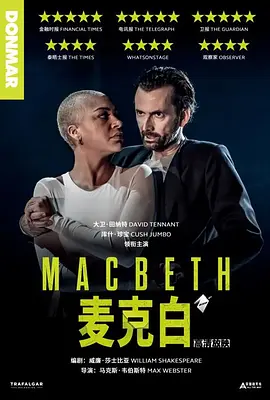
Macbeth
Director: Drama
Cast: David Tennant, Cush Jumbo, Moyo Akande, Annie Grace, Kaspar Nove, More...
User Rating: 7.7/10 (642 votes)
The short review says that Titi adds one star, the child adds one star, and the glass slapping adds one star. Then a friend who feels the same pointed out that the original play is only worth one star. Haha. Indeed. I was quite upset after watching it at that time. Although I had enough time to change the train from the last train to half an hour earlier because it was less than nine o'clock at the end, I still couldn't say its advantages. A few days after watching it, I was no longer as excited (unhappy) as I was at that time. I recorded it calmly. In two days, I really forgot everything. The dividing line of the full spoiler is to talk about the advantages first. Yes, this version also has advantages~ 1. Big Titi. Titi acted too well. Although the director and the actors on the same stage created many difficulties, she burst into light when she had the opportunity. For this reason, I will definitely recommend this version. The most impressive place is also one of the few places in this version of the play that makes people feel the connection between Macbeth and his wife. I think it was completely made up by Titi: the monologue after the servant reported the death of Lady Macbeth and Macbeth said, "She's dead, she's dead sooner or later." In other versions, this part usually only expresses Macbeth's indifference to human nature and his helplessness towards life and death at this point in the story, but Titti gave it a particularly fragile and melancholy tone, which makes people feel Macbeth's deep loneliness and helplessness after Lady Macbeth's death. It's like a eulogy for Lady Macbeth, which is an emotion I have never experienced before. Their connection is much deeper than I imagined. 2. There is a wonderful arrangement. At the banquet after Banquo's death, because the script directly wrote Banquo's ghost, basically every version also has a real ghost. But this version didn't have a person. In other words, most of what we saw before was from Macbeth's perspective, but this version gives us Lady Macbeth's perspective, the guest's perspective. This made me feel a sense of sudden realization, and I very intuitively experienced the dislocation between Macbeth and his wife, that is, Macbeth saw Banquo, and Lady Macbeth thought he saw Duncan. You can even imagine Macbeth seeing Banquo and Duncan, and imagine Lady Macbeth gradually realizing that he had killed Banquo, which gave a lot of space. 3. The child who played all the children is very good, and the future is promising. 4. The stage design is quite good. The overall structure is a square white stage in the center, island-shaped, surrounded by audience seats on three sides, with a glass on the back. The ground behind the glass is still flush with the stage. It can be considered that the area behind the glass is also part of the stage. There are several scenes where characters hit the glass in the back, which is super scary. Lady Macbeth also hit the glass when she was carried away from the back after sleepwalking, which was particularly desperate. The music is also very good! So that's all the advantages. The annoying things about this version: 1. Cutting the bones. To say how short this version is, it's not. After all, Macbeth is not a long play, two hours is also okay. There are also many transition scenes in the original script, so there is room for cutting. But the problem with this version is not that it deleted a few scenes, but that every scene was deleted. Almost every scene was kept, and a little bit was deleted here and there. The fat was cut to thin, and the thin parts are still there. . The final feeling is that the mountains and valleys are filled with potholes. The two hours are pure rambling, and the director is always worried about not having enough time. He doesn't know what he is rushing or what he is being rushed by. For example, my favorite scene between Macduff and Malcolm was deleted in many versions. To be honest, I can understand it, but this version is not. It deleted most of it and left a little bit. As a result, Malcolm was excited and angry at the beginning. I really don't know why. 2. Die. I am so angry that I want to die when I write these two words. I am going to die. Macbeth is a very rare play in Shakespeare's plays that has no comedy elements. There is a reason for this, okay, brother? The director inserted two comedy sections, one large and one small, at two key moments in this play, and they were inserted at the wrong place, which cut off the breath of the whole play twice. The first one, also known as the most unforgivable one, is after the murder of Duncan, the monologue of the gatekeeper was turned into a stand-up comedy. From the form to the content, it is a real stand-up, interacting with the audience and "offending" the audience. It is a super long section. Most of this dialogue is newly written, the style is below average, and it is very embarrassingly long. It was so long that I sat there and wondered if this guy was a relative of the director. Later, I secretly looked up the actor who played the janitor, thinking that maybe he had done stand-up comedy before? But he didn't. Haha, he specifically said in the interview that I don't have a background in stand-up comedy. Well, at least he succeeded in playing a stand-up comedian. He said that this stand-up was inserted in this version to avoid the plot being too intense. May I ask? It's like doing aerobics, the heart rate just passed 100, and suddenly I was told to stop: Stop it, don't be too intense. Then it cooled down to 70. Why is this! I actually think that another problem with this stand-up is more serious, that is, it ruined the work in terms of form. In terms of form, it is a stand-up, five minutes long. The other 100 minutes are a Shakespeare play. This difference and proportion is as weird as a person growing a small fish fin. If it is bigger and richer, maybe it is qualified to be a fish-headed man? But now it is just a small mistake on a human body. The second comic effect is inserted before the duel between Macbeth and Macduff. I don’t know why, no matter which version, this scene is not very good, and there are quite a lot of inexplicable treatments. In this version, Macbeth keeps slapping Macduff’s face. It is quite funny to say it is a provocation or a tease, but just like that monologue is super long, the slaps are endless. You think it’s over, and he comes again... (Of course, I have nothing to complain about watching Big Titty slap people.) As you can imagine, the tension has dropped again. 3. Roles and actors. This version can be said to be very unfriendly to beginners. One of the reasons is the scheduling of the actors. Strictly speaking, except for Macbeth himself, all actors played more than two roles (Lady Macbeth and Lady Macduff have a scene, and it is not clear whether this role was given to this actor, or this plot was given to Lady Macbeth). Everyone was in casual clothes/did not change clothes. There was almost no difference in the performance of the actors between the roles. For example, the child who played all the children mentioned above played Banquo's son, Macduff's son, the prophetic child, and it was once suspected that he played the phantom of Lady Macbeth's son. He even played a general who challenged Macbeth in a duel at the end, but Macbeth broke his neck. It was a bit scary. I am quite curious whether new audiences will confuse the roles? The actors cannot be said to be bad, but they cannot be said to be good either. Malcolm is a strange choice, and he does not look like a ruler. Duncan is vague, Banquo seems to be too shrewd, and Macduff is not mentioned. The gatekeeper forcibly shows his armpit hair. As for Lady Macbeth, there is nothing wrong with her acting skills. She has worked with Titi many times, but there is almost no tension between the two. This version of Lady Macbeth is very much like a tool person, and her mental changes are also very stiff and broken. I think it may be the director's problem. Features that are not considered disadvantages: Camera and headphones. This version may be the one with the biggest difference in viewing experience between theater audiences and theater audiences in ntlive. Several times I felt that this was a movie, not a stage play. The actors' sense of finding the camera (or more likely the other way around) is too strong, and several overhead shots from directly above also deepen this feeling. Close-ups, close-ups, close-ups, tiring. Each audience member at the scene wore a headset, and the music and human voices at the scene were all input into the headset through the microphone. The interview was very ridiculous, saying that in order to let the audience experience the situation of PTSD when the soldiers returned from the battlefield, they would hear the sounds lingering in Macbeth's mind in the headphones, such as roars, voices or other sounds. For example, when Banquo mentioned swallows building nests, the audience would hear the swallows whispering in the headphones. The gatekeeper jumped down from the audience and said, "Are you wearing headphones?" Do you pay to listen to radio dramas? This is the beginning of his stand-up comedy, and it is also the only funny joke.
Read Full Review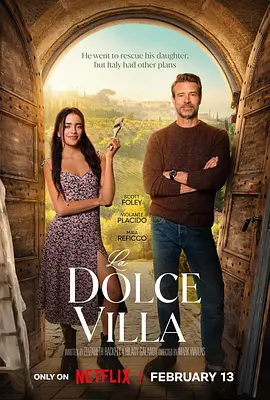
La Dolce Villa
Director: Comedy, Romance
Cast: Scott Foley, Violante Placido, Maya Refico, Giuseppe Futia, Simone Luglio, More...
User Rating: 6.3/10 (620 votes)
Eric, who lost his wife, worked hard alone in the United States; his only daughter fell in love with a villa worth "one euro" in Italy. His loving father flew to Tuscany to stop the sale of the property. Unexpectedly, the father fell in love with the beautiful local mayor. The shabby house looked its most beautiful after careful decoration, and everyone was happy. Although I could predict the ending after watching it for five minutes, I was still very happy to finish the movie because it was so beautifully filmed! [两個心R]Highlight 1: Both the male and female protagonists are extremely good-looking. The female protagonist looks a bit like Sha Lianna, but more beautiful. [Balloon R] Highlight 2: The scenery of Tuscany is also very charming, whether it is the buildings, hillsides, or the sea, everything is beautiful. No wonder the three sisters Antonia sit in the hot springs and play around every day. I envy them so much. I don’t even need to learn this life philosophy of “doing nothing and enjoying leisure time”. I’m already familiar with it [shy R] [Wither R] Complaints: The plot is a bit clichéd, the conflict and reconciliation between father and daughter are too smooth. It would be better if the attitude towards life could be explored in depth. It seems that the whole movie is too much for Valentine's Day.
Read Full Review
Last Breath
Director: Drama, Thriller
Cast: Woody Harrelson, Simu Liu / Finn Cole, Cliff Curtis, Mark Bonnar, More...
User Rating: 6.4/10 (3156 votes)
"Last Breath" is a film based on a real submarine disaster in the North Sea of Scotland in 2012. When experienced deep-sea diver Chris was on a mission in the North Sea, a huge storm caused the ship to drift, and his oxygen tube was cut off, trapping him on the seabed, with only 10 minutes of backup oxygen! In the dark sea storm, the captain, technicians, and the leaders of the diving team Ducan (Woody Harrelson) and Dave (Liu Simu) worked together to launch a thrilling rescue operation. Before watching the movie, S asked me, if the backup oxygen only lasts 10 minutes, why can the movie be shot for 90 minutes? Shouldn't it be finished in 10 minutes? I said, maybe there is a synopsis of the previous story, reminiscing about life, or it is like "24 Hours", shot from one person's perspective. After watching it, I found that these are not all correct. The main reason is that after the oxygen was exhausted in ten minutes, the protagonist still lasted for 30 minutes! I won't spoil the result, you can go and see it for yourself. Although the film is only 90 minutes long, I appreciate the compact rhythm of this purely commercial film. The story is told neatly, without dragging or over-exaggeration, which is enough. The theater also maximized this effect. As soon as the lights were turned off, the music, pictures and photography came out, which immediately made me understand the difference between a movie that can be released in theaters - even a small commercial film - and a streaming network movie like "The Canyons". First of all, the authenticity of the details. Compared with "The Last Breath", "The Canyon" looks like an AI cutout. Although a beautiful interior scene was built, the rest is all cutout CG, which is completely unreliable. It feels like the male and female protagonists are playing the Sims. Such an old tower, but the interior is brand new. There was a blizzard outside, and the heroine came out in shorts, as if there was no use for the blanket on her body that might fall off at any time. Look at the rust, iron cages, and mechanical air pipes in "The Last Breath", and the difference is obvious. The second is the problem of logic. The setting of "The Canyon" is pleasant, especially the uninhabited forest tower in the subarctic zone of the northern hemisphere, which is simply a paradise for I people, but the various story logic loopholes are like a sieve. In contrast, "The Last Breath" is adapted from a true story, and the whole story is very solid. The director also made a documentary for this movie. Chris lasted 30 minutes without oxygen, which is a miracle in itself, but what is more miraculous is that the team did not give up on him. From the captain, the first mate to the technicians, as well as the leader of the diving team Ducan and the silently dedicated Dave, the cooperation, courage and human brilliance of the entire team who never abandon or give up, regardless of the final result, is the biggest miracle. Finally, I would like to use a paragraph to praise Simu Liu. In mainstream North American movies, Simu Liu is almost the only East Asian face who can play the leading role - I am not talking about TV series and movies with Chinese as the main characters. Do you know how difficult this is? Compared with Chen Sicheng's boastful "🍬探1900" which illogically incites national sentiment, seeing more and more Chinese appear in European and American film and television circles is to do things step by step in a down-to-earth manner. To give an inappropriate analogy, if you support not overfishing, then there is no need to yell at your parents at home not to eat fish. Going to the school community to call on everyone not to eat fish is doing things. Simu Liu's emotional acting is actually not very good, but once the action is added, it is very qualified, and he plays the image of a taciturn but brave and kind comrade-in-arms. Simu Liu is really the pride of the Chinese!
Read Full Review